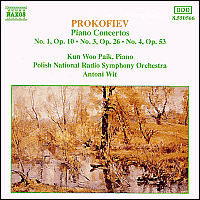PROKOFIEV
Piano Concertos; 3 in C, Op 26, 4 in B flat for the left hand, Op
53; 1 in D flat Op.lO.
 Kun Woo Paik, Polish National
Radio Symphony Orchestra, Antoni Wit.
Kun Woo Paik, Polish National
Radio Symphony Orchestra, Antoni Wit.
 Naxos 8.550566 [71.33)]
(DDD)
Naxos 8.550566 [71.33)]
(DDD)

These are good performances of three diverse and brilliant piano concertos.
The first one on this disc is number 3 which the distinguished pianist Martha
Argerich has made her own in two splendid recorded performances, first with
Abbado and then with Dutoit. She has more sparkle, speed and excitement than
this performance but, nonetheless, this Korean pianist, who studied at the
Julliard School of Music in New York, gives a very good performance. lie
is a virtuoso and you have to be to play this incredibly difficult score.
The reason why many pianists say that they dislike it and, consequently,
will not play it is merely a cover up for the fact that it is probably beyond
them.
It is decidedly Russian as the opening clarinet theme indicates. The andante
gives way to an energetic allegro which scintillates and fascinates. The
second movement is a theme and variations and shows many colours of both
the piano and the orchestra. The bassoon starts the finale which bristles
along with sardonic humour.
What makes this a fine concerto is that it exploits the piano. A piano concerto
that does not do that is hardly a concerto. Much as I love the concertos
of Haydn, Bach and Mozart they do not exploit the piano which instrument
now has a reputation that expects it to produce some fireworks, a reputation
it shares with the violin. However, Prokofiev wisely includes his own brand
of lyricism.
The soloist here captures all the qualities although he, and everybody else,
will never approach the marvellous talent that Argerich has for this concerto.
She has a reputation as well and that is for playing allegros too fast. Well,
maybe.... but what excitement she generates!
At this year's Promenade Concerto she transformed the Schumann concerto out
of that dreary and dreamy type of performance and made it live. All music
must sound as if it is living and not sound like a resurrected corpse and
all music must move and press onwards. Static and pompous music is never
high on communication skill.
I have always had a soft spot for Concerto no.4
written for Paul Wittgenstein (1887-1961) who lost his right arm
in the Great War. Ravel, Richard Strauss and Britten wrote works for him
but he did not take to any of them. He admitted that the Ravel was the best
piece of the three quoted but he could not abide the Britten
Diversions of 1944 which was the
main reason why Britten revised the piece in 1954. It did not improve
the piece. Wittgenstein vastly preferred Schmidt's
Piano Concerto no.2 and, to some
extent, this Prokofiev concerto but he did not understand it and so did not
play it. Its premiere was in Berlin in 1956
Even a great composer like Prokofiev can produce a rare work with a lower
level of inspiration. This concerto is badly balanced. The slow second movement
is almost half its length and the fourth movement lasts under two minutes.
Michel Beroff with the Leipzig Orchestra under Kurt Masur made a good recording
of this work but it is the version with John Browning and Leinsdorf that
really excels. However much a paradox it may seem this work's weakness is
its strength.
The Piano Concerto no. 1 is a one
movement work lasting about 16 minutes. It has a gorgeous theme and the
exhilarating high spirits of late romanticism. The two outstanding performances
are Ashkenazy with the LSO under Previn and Mindru Ashkenazy's coupling is
Prokofiev's Piano Concerto no.
2 an absolutely magnificent
piece. I was present at a concert when John Lill played it under the baton
of Bryden Thomson and I have never looked back.
Incidentally, we wish John Lill well after he was mugged and had his hand
slashed after giving a recital for the Queen Mother recently.
The soloist here makes a good performance but again I wanted a bit more sparkle
and the percussion to punctuate a little stronger.
But for a flyer this recording is a bargain and the Polish orchestra play
well. I have noticed that the best European orchestras are invariably Polish.
Wit is well in control and I like his style as I do his Bruckner, incidentally.
David Wright.
Performances

Recording

